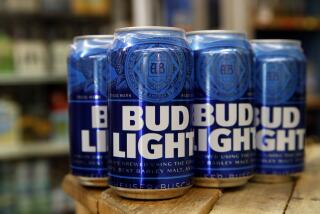Setbacks Take Fizz Out of Coca-Cola’s Expansion
- Share via
The health scare that Coca-Cola Co. is scrambling to address in three European countries is just one of several recent business setbacks that threaten to tarnish the carefully cultivated brand image of the world’s largest soft drink company.
Coke, which is recalling cans and bottles in Belgium, Luxembourg and France, recently was hit with a racial discrimination lawsuit in the U.S. Regulators in foreign countries, concerned with its growing dominance, are forcing Coke to scale back planned acquisitions. And as Coke struggles to jump-start worldwide soft drink shipments, arch-rival PepsiCo Inc. is showing renewed vigor.
“The stars definitely are in the wrong constellation for Coke,” one industry observer said. “It’s not just the European situation or the regulatory problems. It’s also how American consumers will react to the discrimination lawsuit. . . . The No. 1 job of our friends in Atlanta is to safeguard that brand. And allegations of discrimination, or that the company is another Microsoft, hurt.”
Coke’s shares rebounded slightly Wednesday in New York Stock Exchange trading, finishing up 13 cents to close at $63.88. But the stock is trading well below the yearly high of $88.94 reached last July. Observers said it’s still uncertain how consumers and investors will react to what likely will be Coke’s largest-ever recall.
Health officials in Belgium said that nearly 100 consumers, many of them children, had fallen ill during the last week after drinking Coke products. French officials said that 80 consumers had complained of headaches and upset stomachs. Belgium and Luxembourg responded by banning the sale of all Coke products. France prohibited the sale of certain Coke products, and Coke voluntarily stopped shipping some cans and bottles to the Netherlands.
Coca-Cola maintained that independent bottlers had corrected problems uncovered during an internal investigation. But worried regulators in the European countries refused to lift the ban until after they can review a Coca-Cola report to be delivered today.
The impact of the recall in Belgium has been magnified, observers said, by separate government investigation into whether poultry in that country has been contaminated by dioxin. That probe has put consumers on edge.
“The extremes run from a conspiracy theory in which Belgium is being targeted by food tamperers through to Coca-Cola’s quality control processes simply falling down,” said Allyson Stewart-Allen, a London-based marketing consultant. “My bet is that it falls somewhere in between.”
Coke’s internal investigation determined that an independent bottler in Antwerp had been using a defective shipment of carbon dioxide, which is used to create bubbles in soft drinks. Coke said the faulty gas canisters have been removed, and that bottles with the defective carbon dioxide have been removed from the market.
Coke also said that a fungicide used to treat shipping pallets at a French plant had been rubbing off on cans and creating “an external odor.” The bottler has stopped using the wood treatment product, but Coke maintained it wasn’t a health hazard.
Coke’s explanations drew a skeptical response from newly appointed Belgian Health Minister Luc Van den Bossche, who complained that Coke wasn’t moving quickly enough. “It’s a bit disturbing that a big firm with worldwide fame . . . did not take far-reaching measures more spontaneously and more promptly.”
Marketing industry observers described Coke as the latest in a series of multinational companies that have struggled to keep a local problem from mushrooming into a worldwide nightmare.
“This is a classic case of how PR management blends into brand management,” said David Redhill, executive director of Landor Associates, a San Francisco-based company that has worked with both Coca-Cola and Pepsi. “The way you’re perceived to have reacted to a crisis like this is determined by how upfront you address the problem. And Coke is in a good position to deal with it upfront.”
“The best approach for a company in this situation is to redirect people’s attention to what you do best,” said USC marketing professor Michael Kamins. “You redirect peoples’ minds by telling them that you sell Coke in 112 countries and you’ve never had this problem before. You tell them you’re not the market leader for nothing.”
Cola industry observers say the health scare isn’t likely to translate into a substantial opportunity for Pepsi. Coke is the dominant cola brand in Belgium, for example, with a 63.7% share, according to John Sicher, editor and publisher of Bedford Hills, N.Y.-based Beverage Digest.
Pepsi’s top European executive told employees in an internal memorandum circulated Wednesday, “We do not intend to take advantage of this situation during this crisis.” Wayne Mailloux also said, “All of our checking has confirmed that no Pepsi products are affected by these contaminations.”
Coke said that Belgium and Luxembourg account for less than 1% of the company’s total sales volume.
What’s uncertain is how quickly Coke can rebound from the health scare and the other setbacks.
Objections from regulators in France, Australia and Mexico have forced Coke to scale back planned acquisitions of drink lines owned by Britain’s Cadbury Schweppes and France’s Pernod Ricard. Coke subsequently reshaped the deals that again are being reviewed by regulators.
Coke, which controls more than half of the world’s soft drink market, in April reported lower year-over-year first-quarter profit, sales and unit case shipment volumes. It has formed a council of high-ranking executives to advise Coca-Cola Chairman and Chief Executive M. Douglas Ivester on racial diversity.
“This period is a test of character for Coke,” said Tom Pirko, head of Bevmark, a New York-based beverage industry consulting firm that works with the soft drink giant. “It’s a chance for Doug Ivester to go beyond the commercials and take it upon himself to become a spokesman for Coke’s culture. Americans love to forgive . . . but Coke can’t be too passive. It can’t lie low and hope it all passes.”
More to Read
Inside the business of entertainment
The Wide Shot brings you news, analysis and insights on everything from streaming wars to production — and what it all means for the future.
You may occasionally receive promotional content from the Los Angeles Times.










